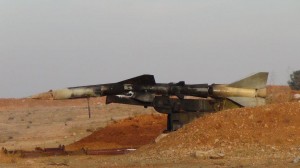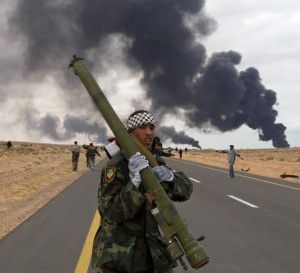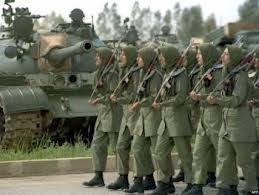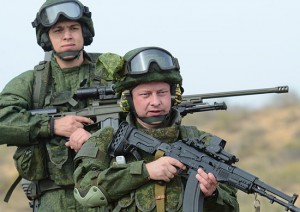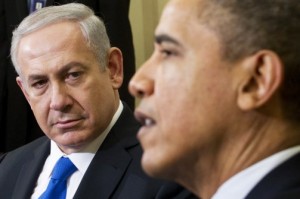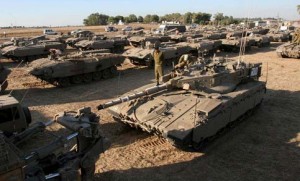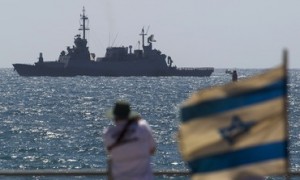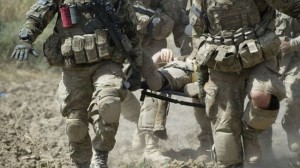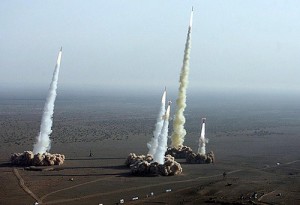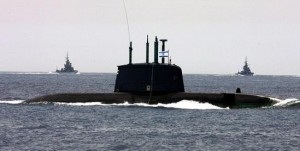
Israel’s submarine fleet will launch the initial strikes against Iran.
Media reports suggest war between Israel and Iran appears imminent within the coming months, but in fact, has already begun. Perhaps, this reality has been completely missed because the media convinced itself and the public the opening salvos for an Israeli attack on Iran would look like an air force bombing raid of Iranian nuclear installations. We have pointed out for years this air force centric battle plan has been a deception operation as a true bombing raid would be too likely to fail and not achieve decisive long term effects. Further, a limited Osirak type raid would leave the Israeli homeland completely vulnerable to organized and sustained retaliatory strikes. Contrary to how the ill-informed pundits thought this war would play out, Israel has a much better war plan to support “its interests” that is unfolding as you read this piece. Whether or not the United States willing joins the war will affect this battle plan and impact “how bad” it will be for the U.S. The best case would be an immediate move by Washington to decisively prevent war between Israel and Iran, but that seems highly unlikely now. As such, one must assume the U.S. maintains its current policy towards Iran and will attempt to stay on the sidelines “hoping” Israel won’t attack. Under those conditions, the following Israeli battle plan will likely be executed within the next 4-8 weeks.
The basic plan is as follows:
Phase I: Prepare the populace and the military for war. Obtain needed intelligence of the battlefield and attempt to build war sentiment inside Israel and the U.S. Finalize acquisition of weapons systems and ordnance. Place the military on a war footing.
Phase II: Reduce the near border threat and open a safe flight path to Iran. Using asymmetric means, degrade Hezbollah and Syria to a minimal threat incapable of sustained, coordinated, state level military operations. Attempt to leverage the presence of chemical and biological weapons as well as friction with Turkey, a NATO member, to draw the U.S. into the war early.
Phase III: Launch a surprise false flag attack on Iran that appears to emanate from the Americans. The strike will include initially non-attributable electronic attacks, cyber warfare, and submarine launched missiles. Limited commando raids may also take place.
Phase IV: Using the plausible deniability of who conducted the initial attack, leverage the Iranian confusion to bait them into attacking the U.S. and forcing America into the war if it hasn’t already joined.
*Note: If Iran responds discriminately only against Israel and the U.S. is not pulled into the conflict, this will be the signal for immediate, large scale follow-on attacks that will obliterate Iran’s infrastructure. This is necessary to mitigate the potential damage inside Israel from retaliatory strikes.
Phase V: Bring war to rapid closure and hand-off the conflict to the U.S military within 30 days. If Iran continues to retaliate against Israel, Israel will respond with further massive missile strikes with follow-on strikes by the air force using manned and unmanned platforms. The Israeli military will relentlessly attack Iran to inflict maximum damage and casualties so as to force U.S. intervention and or the U.N. to broker a cease fire.
*Should Iran, Hezbollah, or Syria attempt to or actually retaliate using chemical or biological weapons, if Iran is able to heavily attack Israel successfully, or if Israel is unable to achieve its goals in the reduction of Iranian nuclear facilities, Israel plans to use nuclear weapons to achieve victory and protect its homeland.
To understand Israel’s actual battle plan formulation, one must first turn the chessboard around and understand Israel’s goals, perceptions, and capabilities in the manner Israeli decision makers see the pieces. Foremost in their minds has to be the preservation of the Jewish State. Any limited attack that achieved indecisive goals, but risked the homeland would not be suitable. Second, Israeli leadership, specifically, Israeli Prime Minister Benjamin Netanyahu, perceives Iran as an existential threat that must be destroyed at all costs. However, Netanyahu is clever and cunning enough to know better than getting into a fair fight with Iran.
Israel’s national capabilities, which relative to other Middle Eastern countries are immense, include a first rate military and renowned air force. Their navy has also made great strides and has spent a massive amount of money acquiring latest generation retrofitted German-diesel submarines capable of launching long range missiles. Respective of strategic weapons, Israel has what is believed to be a significant stockpile of nuclear weapons that could provide deterrent, first, and second strike options during a war. These nuclear weapons could be delivered by aircraft, drones, or missiles launched from the land, sea, or air. Further, Israel has demonstrated an advanced technological arsenal that includes electronic and cyber warfare capabilities, missile defense systems, surveillance and reconnaissance assets, and is a world leader in the design and production of drones and other autonomous systems. Nonetheless, Israel still has a very limited power projection capability beyond its shores. It also has limited natural resources, finances, and industrial capabilities. Perhaps most worrisome when assessing a war of attrition with Iran, Israel is acutely aware it has relatively limited land area and a small population. This means any successful deployment of Iranian weapons such as missiles and rockets are more likely to cause significant casualties and damage and quickly reduce the public will and support for a sustained. In short, Israel can’t domestically endure significant military damage and neither can its elected leaders. Netanyahu is keenly aware of the fate of former Prime Minister Olmert after the failed 2006 Lebanon War. Finally, Israel has a powerful international support base of wealthy elites and routinely demonstrates the significant power of its lobbying infrastructure to maneuver political will inside the United States.
Next, one must understand Iran’s capabilities in a similar manner. Iran’s regime is most afraid of losing power and inversely, is most concerned with maintaining power. Maintaining power, much like in other countries is predicated on polarizing the masses and using religion as a patriotic call to national defense. In Iran’s case, painting Israel and the U.S. as the enemy is a relatively easy case in light of the repeated wars on Muslim lands and peoples, three decades of crippling sanctions, assassination of its scientists, and repeatedly addressing Iran as an existential evil threat that must be destroyed. This demonization of Israel and the U.S. is woven intricately into the fiber of Iran and has no doubt radicalized much of its population. Iran has used this fervor to build up a substantial military that has grown more and more independent of foreign assistance and military hardware sales. This has been the result of adapting to decades of sanctions and has to some degree inoculated Iran from further effects of sanctions. Iran’s large population and land area make it more able to endure and absorb repeated attacks. Iran also has significant reserves of both oil and gas and enjoys the disproportionate political sway it gains by influencing the global economy. Regarding Iran’s military, it has a large pool of conscripts, a substandard air force, and inferior weapons technology. However, Iran has learned from the U.S. and Israeli wars over the last decade and has made itself a much more capable enemy. It has developed a dispersed, decentralized, civilian militia capable or harassing any occupying military endlessly. It has also developed robust anti-access technologies to include many anti-ship missiles, naval mines, small fast attack missile boats, significantly improved air defense systems, and surface to surface missiles with significantly improved targeting and range. Iran also maintains stockpiles of both chemical and biological weapons that could be used in retaliation for an attack. Most worrisome to Israel though is Iran’s development of a 5th column in Lebanon consisting of Hezbollah, which is reportedly to now be rearmed with hundreds of thousands of shorter range rockets and anti-tank weapons and a client state in Syria with a fully capable conventional military sitting on Israel’s border.
Using the above as a general framework to begin piecing together assumptions about an Israeli war plan, it should be clear that a prolonged war is not in Israel’s interests, an invasion or occupation of Iran would be impossible, and Israel can’t afford to endure prolonged attacks domestically. Defensively, although Israel’s missile defense systems could likely shield it from most long range Iranian missiles, it would likely be overwhelmed by a massive launch of rockets and missiles from Hezbollah. A Syrian supported front on Israel’s border would also open a fight bigger than Israel is willing to undertake and allow Iran to continuously resupply Hezbollah. Iran’s anti-access technologies are not much of a threat to Israel since Israel is located far beyond the range of these weapons, but Iran’s air defense system must be contended with if a manned strike is to be successful. Israel also can’t afford risking the possibility of an Iranian chemical or biological retaliation. As such, Hezbollah and Syria must be neutralized before any attack could take place to remove the immediate threat to Israel’s homeland and Iran’s retaliatory capabilities in respect to Israel must be eliminated. Israel must also seek out a plan that enables its piloted aircraft to successfully make round trip sorties to and from Iran. Note that how Iran’s response affects “Israel” in this calculus is not the same as how Iran’s response affects the “U.S.” This is an ominous observation for the U.S.
Moving forward and building out the attack plan, a basic order of operations can be established. First, the homeland must be prepared to endure retaliatory strikes and the military assets must be in place. This includes generating the propaganda and domestic support for a war as well as developing and procuring the proper military technology, equipment, and weapons. Jointly, diplomatic avenues must be exhausted and low-level covert war options must have had a chance to work. Finally, a thorough intelligence preparation of the battlefield must have been completed. Second, Hezbollah and Syria’s ability to jointly wage war on Iran’s behalf must be at least neutralized in a way to not spark an outright kinetic war with Iran. Israel cannot prosecute a war with Iran successfully without first eliminating this close border threat. Third, Iran must then be attacked violently by surprise in a total fashion that prevents any possibility of it being able to respond with missiles capable of striking Israel. Fourth, Israel must leverage this initial surprise attack to pull the U.S. into the war. This will be necessary to achieve more decisive long term effects on Iran’s nuclear development and minimal expense to Israel in manpower and money. Finally, Israel must bring the hostilities to a rapid closure. This means either handing off the sustained large scale campaign to the United States or prosecuting further attacks against Iran to increase the amount of damage done and forcing a peace treaty or ceasefire. This final phase could go as far as delivering a final decisive blow using nuclear weapons (or the threat of it to make sure the U.S. finishes their fight) if Iran has somehow managed to inflict severe damage on Israel proper.
Now that a clear order of operations has been established, it is a relatively simple process of plugging in Israel’s capabilities to their proper place and adding a dash of strategy and deception to achieve surprise. To be specific, this war plan has already been implemented and is under way. In fact, we are nearing the end of Phase II. The destabilization of Syria is the Phase II answer for how to take down Iran’s capabilities to threaten Israel at its border without immediately provoking a war. Rest assured, under no other lesser circumstances would Israel allow Sunni backed jihadists to overthrow Assad, a ruler that Israel has maintained an awkward détente with for years. This would be trading a tolerable for horrible. Phase II will now continue until Syria is assessed to have been rendered incapable of organized, state level, sustained military operations against Israel. The residual jihadists fighting amongst themselves like in Libya for power will be used as an excuse later to deal with Syria in totality after Iran is attacked and the U.S. is suckered into the war (assuming the U.S. can’t be suckered into the war sooner using Syria as a pretext). Still though, Israel doesn’t believe Hezbollah will be completely neutralized by this. Instead, they project that Hezbollah’s ability to sustain combat operations will be extremely degraded without Syria to funnel supplies and support from Iran to them, but still will have the ability to launch attacks for 3-4 weeks. To mitigate the residual threat from Hezbollah, Israel has implemented Iron Dome, an air defense system capable of shooting down rockets and missiles launched from Hezbollah fighters in Lebanon and Syria. Israel has also developed in-depth civilian preparedness programs to include alert systems, bunkers, drills, and rapid response capabilities to mitigate any damage from any attacks that are successful.
Phase III of the war is yet to begin, but will likely correlate with the neutralization of Syria before the fall elections in the U.S. This window is critical because Netanyahu knows that any strike before the election essentially forces President Obama to support it or risk losing the election. Obama has to pull votes of Southern Baptists and conservative Christians from Romney, and most importantly, must have Jewish support in the form of money and votes; especially, in a swing state like Florida, to win. Should Obama leave Israel hanging, it will open him up to massive attacks from the neo-conservative Zionist Romney as weak and not supportive. As such, Obama could be cornered into either actively taking part in a war or unwillingly being forced into Israel’s war. Both situations are catastrophic for the U.S., but good for Israel. If Netanyahu waits, he risks losing his opportunity to pull the U.S. into the war; especially, if Obama is reelected, which looks to be the case based on current polling numbers.
Phase III will begin the actual kinetic phase of operations against Iran. It will start with an unprecedented electronic attack that includes wide spread cyber-attacks, disinformation and deception operations, jamming, and potentially the used of targeted electronic pulse weapons to blind and destroy the situational awareness of Iran’s command and control elements to include destruction of Iran’s power grid and telecommunications networks. Nearly simultaneously, Israel will launch its largest missile attack in the nation’s history. It will include the full range of missiles launched from the air, ground, and sea. Jericho ballistic missiles with modified heavy payloads and submarine launched missiles will be some of the primary weapons used. Submarines will likely launch first. Israel has secretly poured billions of U.S. tax dollars into the development of its submarines and their launch capabilities. This has not been by accident. In fact, tracking the location of Israel’s submarines will be one of the best indicators for when Israel is about to strike. The U.S. should put a premium on shadowing these subs over any other submarine missions currently on-going. In fact, there is a reasonable argument that the U.S. should use whatever force is necessary to prevent Israeli subs from launching an attack due to the dire consequences it will have for America. Israel will also likely use a mix of attack drones to carry out some of the initial wave of attacks. Israel may also use an electromagnetic pulse (EMP) weapon to destroy Iranian electronics and black out their grid. This could come in the form of a high altitude nuclear detonation.
Phase IV will be executed in parallel with Phase III and leverage the ambiguity and the violence of the initial phase of electronic warfare and submarine strikes to hopefully bait Iran into incorrectly assessing the attack as coming from the U.S. This is likely as it will be a very advanced attack, primarily submarine launched, and have no humans initially involved. This looks like a classic sterile American type attack and gives Israel plausible deniability while confusing the Iranian decision cycle. This false flag, deception operation is classic Israeli military doctrine and emblematic of Israel’s past military operations. If Iran perceives the attack to be from the U.S., its response is much more likely to be extreme in that it either does nothing and capitulates or retaliates broadly at American and Arab interests in the region instead of Israeli targets. Military bases, American warships, and oil infrastructure are the most likely targets for Iran and would bring both the U.S. and Iran’s neighbors such as Saudi Arabia into the war against it. This would allow Israel to bow out of the fight it started successfully. Further, the operational pause in the Iranian decision cycle allows Israel to assess how it completes Phase III and moves to Phase V. If Iran does nothing, mission accomplished. If Iran retaliates against the U.S. and it is clear the Americans will enter the war, mission accomplished. However, if Iran retaliates against Israel selectively and or the U.S. doesn’t get immediately into the war, Israel must immediately move to mitigate any possible retaliatory damage Iran can inflict. This means that Israel will complete Phase III with clearly attributable Jericho missile strikes and strikes from drones against a much broader range of targets to include Iranian missile sites, command and control centers, and oil infrastructure in addition to nuclear facilities.
Moving into Phase V, Israel will again attempt to pull the U.S. into the war if it did not succeed in Phases III and IV. They will most likely threaten to have to use nuclear weapons to finish it or start a bigger war with Syria that risks entire regional destabilization. In exchange for Israel restraining its attacks, America will enter. If not, Israel will move into their least desirable portion of the entire operation and begin manned airstrikes against Iranian targets by transiting Syrian airspace. Israel must plan on losing some of its aircraft and crew during this phase, but ultimately, they will be able to successfully hit targets in in the north and west of Iran. Jericho missiles will have to attack the more distant targets if the U.S. failed to enter the war. Once Israel has exhausted its target list and U.S. supplied heavy ordnance penetrators, Israel will enter into United Nations peace negotiations, which undoubtedly will be in full swing to try and stop the “humanitarian suffering.”
The ominous caveat to this five phase war plan comes if from the outset, Israel knows that the U.S. will not get involved, is unable to achieve mission goals, or if Iran, Syria, or Hezbollah appears to be about to retaliate with chemical or biological weapons. In any of the three scenarios listed, Israel may very well use nuclear weapons to achieve its goals. The saying no plan survives first contact is absolutely gospel and for Israel, that means they must have a worst case scenario plan at the ready. Dangerously, their worst case also equals our worst case from an American perspective. Any war in the Middle East is going to be awful, but a nuclear war will be catastrophic. Nonetheless, the Israelis see it as acceptable for their nation’s survival even though it probably also means the end of life as we know it in the U.S. as the global economy collapses and we are forced to try and contain the literal fallout of “their” war.
The above war plan is the baseline for Israel’s planning against Iran that they have desperately tried to keep secret. What Americans must realize, including both the President and his challenger Mitt Romney, is that Israel’s plan for war is fundamentally designed for Israeli interests. The battle plan does not take into account any equities that the U.S. or other Arab countries may have when it comes to getting caught in the crossfire. An Israeli strike will not achieve decisive long term effects, but obliterate Iran’s infrastructure and throw the entire region into greater instability. The damage will reach much further than Iran’s borders and disrupt regional power grids, global economies, and set loose another decade of sectarian bloodshed and ethnic conflict. Should the U.S. voluntarily involve itself from the beginning, the battle plan will decidedly shift to take into account American interests and capabilities, but will still be horrible for the U.S. and not achieve decisive long term results. Still though, the hope that we could control the chaos better may be enough to sucker America into the fight unilaterally on Israel’s behalf. President Obama, if seriously threatened by Romney, may also opt to create a convenient crisis before the election to distract the voters and spin it to his benefit. However, should the U.S. be forced into a surprise war with Iran through Israeli deception and a potential false flag attack, the U.S. would suffer much worse and achieve even less decisive results. Either way, the cost of a war is much too great for Americans to accept. This is not America’s war. American policy MUST look out for American interests first. This means Israel must be stopped from starting a war that will cause global disaster for the U.S.


